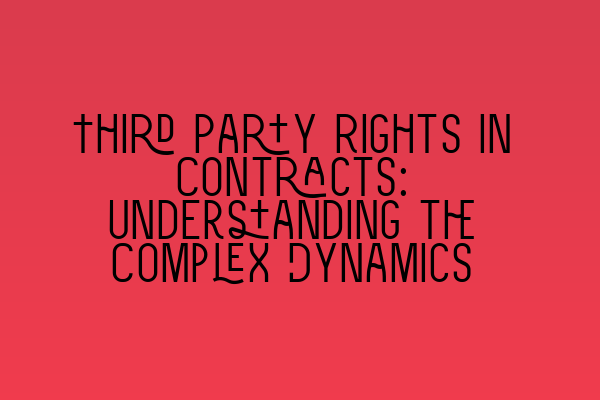Third Party Rights in Contracts: Understanding the Complex Dynamics
Contracts are an essential part of various legal transactions, serving as the foundation for business agreements, partnerships, and deals. When entering into a contract, it is crucial to consider the rights and obligations of the parties involved. However, what happens when a third party, who isn’t initially a party to the contract, seeks to enforce its rights or benefit from the agreement? This is where the concept of third party rights in contracts comes into play. In this blog post, we will explore the complex dynamics of third party rights in contracts and shed light on why it is essential to understand and address them.
Before diving deeper into the intricacies of third party rights, it is crucial to comprehend the basics of contract law. A contract is a legally binding agreement between two or more parties, creating mutual obligations and imposing legal consequences for failure to fulfill these obligations. Traditionally, only the parties directly involved in the contract had rights and duties towards one another. However, there are situations where an outside party may have a legitimate interest in the contract and should be able to benefit from or enforce its provisions.
The concept of third party rights in contracts allows for these situations to be addressed. It enables parties to confer benefits or impose obligations on individuals or entities who are not party to the contract itself. This can be beneficial in various scenarios, such as when a contract involves the transfer of assets, assigns rights to a third party, or when a contract is designed to benefit a specific class of people.
To better understand the complexities involved in third party rights, let’s take a closer look at the different types of third party rights that can arise in contracts:
1. Intended Third Party Beneficiaries: In some cases, a contract may expressly state that it is intended to benefit a third party. For instance, if Party A enters into a contract with Party B to build a house for Party C, Party C would be considered an intended third party beneficiary. As an intended beneficiary, Party C can directly enforce the terms of the contract and seek remedies for any breach.
2. Incidental Third Party Beneficiaries: Unlike intended third party beneficiaries, incidental third party beneficiaries are not explicitly mentioned or intended to benefit from a contract. Instead, their benefit is merely incidental to the contract. Incidental beneficiaries generally do not possess direct rights to enforce the contract.
3. Assignment of Rights: Contracts often allow for the transfer of rights and obligations to third parties through an assignment. For example, if Party A owes Party B a debt, Party A can assign that debt to Party C. As the assignee, Party C steps into the shoes of Party B and can enforce the contractually assigned rights against Party A.
Understanding the different types of third party rights is essential to ensure that all relevant parties are accounted for and that their rights are protected. Failing to address or overlook these rights can lead to disputes, confusion, and potential legal consequences.
When drafting a contract, it is crucial to be clear and explicit about the intentions regarding third party rights. Careful consideration and language should be given to whether third parties are intended beneficiaries or if rights can be assigned. Including specific provisions or clauses regarding third party rights can help minimize ambiguity and prevent potential disputes.
Additionally, it is important to note that third party rights in contracts can be subject to various legal considerations and limitations. For instance, in some jurisdictions, the Contracts (Rights of Third Parties) Act may apply, granting third parties the ability to enforce certain rights. However, certain contracts may expressly exclude or limit the rights of third parties.
To ensure a thorough understanding of third party rights in contracts, it is advisable to seek legal advice from an experienced contract law solicitor. They can provide guidance on the intricacies of contract law, draft contracts that effectively address third party rights, and assist in resolving any disputes that may arise.
In conclusion, third party rights in contracts are a complex and crucial aspect of contract law. Understanding the different types of third party beneficiaries, as well as the implications of assigning rights, is essential for drafting clear and enforceable contracts. By addressing third party rights, parties can protect their interests, avoid disputes, and ensure the smooth execution of contractual obligations.
Related Articles:
– SQE 1 Practice Exam Questions
– SQE 1 Practice Mocks FLK1 FLK2
– SQE 2 Preparation Courses
– SQE 1 Preparation Courses
– SRA SQE Exam Dates
